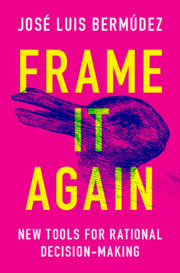Book contents
- Frame It Again
- Frame It Again
- Copyright page
- Contents
- Figures
- Tables
- Acknowledgments
- 1 Priming the Pump: Framing Effects and the Litany of Human Irrationality
- 2 Framing: The Classic Experiments
- 3 Where the Rubber Hits the Road: Investors, Frames, and Markets
- 4 Juliet’s Principle
- 5 Rational Frames?
- 6 Agamemnon and Climate Change
- 7 Framing Temptation and Reward: The Challenges of Self-Control
- 8 Chickens and Chariot Races: Framing in Game Theory
- 9 Fair’s Fair: Framing for Cooperation and Fairness
- 10 Getting Past No: Discursive Deadlock and the Power of Frames
- 11 Opening the Door to Non-Archimedean Reasoning
- Appendix Frames in the Brain
- Bibliography
- Index
2 - Framing: The Classic Experiments
Published online by Cambridge University Press: 15 October 2020
- Frame It Again
- Frame It Again
- Copyright page
- Contents
- Figures
- Tables
- Acknowledgments
- 1 Priming the Pump: Framing Effects and the Litany of Human Irrationality
- 2 Framing: The Classic Experiments
- 3 Where the Rubber Hits the Road: Investors, Frames, and Markets
- 4 Juliet’s Principle
- 5 Rational Frames?
- 6 Agamemnon and Climate Change
- 7 Framing Temptation and Reward: The Challenges of Self-Control
- 8 Chickens and Chariot Races: Framing in Game Theory
- 9 Fair’s Fair: Framing for Cooperation and Fairness
- 10 Getting Past No: Discursive Deadlock and the Power of Frames
- 11 Opening the Door to Non-Archimedean Reasoning
- Appendix Frames in the Brain
- Bibliography
- Index
Summary
What I call the litany of human irrationality is a catalog of examples of widespread breakdowns in human reasoning. The litany reflects literally decades’ worth of experiments and research into human reasoning. Framing effects are one of its chief exhibits. Any discussion of framing and decision-making needs to start by looking very carefully at the experimental literature and how it has been interpreted.
The experiments show that outcomes and scenarios can be framed in different ways and that these different frames affect how people evaluate and react to those outcomes and scenarios. Some of these framing effects exploit tight connections between framing and how risk is evaluated and perceived. It turns out that people tend to be much happier to take risks when they are faced with possible losses, and more resistant to risk when faced with possible gains. And in fact, as the experiments show, people will react differently to the same outcome when it is framed in terms of a possible loss as opposed to a possible gain.
- Type
- Chapter
- Information
- Frame It AgainNew Tools for Rational Decision-Making, pp. 20 - 43Publisher: Cambridge University PressPrint publication year: 2020



